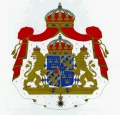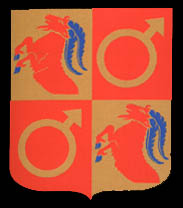Boxholm: Difference between revisions
Knorrepoes (talk | contribs) m (Text replacement - ". ===Origin/meaning===" to "|- |'''English''' | {{blazon wanted}} |} ===Origin/meaning=== ") |
Knorrepoes (talk | contribs) m (Text replacement - "Literature :" to "'''Literature''':") |
||
| Line 28: | Line 28: | ||
{{media}} | {{media}} | ||
[[Literature]] : Nevëus and De Waern, 1992. | '''[[Literature]]''': Nevëus and De Waern, 1992. | ||
[[Category:Swedish Municipalities B]] | [[Category:Swedish Municipalities B]] | ||
[[Category:Östergötland]] | [[Category:Östergötland]] | ||
[[Category:Östergötlands län]] | [[Category:Östergötlands län]] | ||
[[Category:Granted 1940]] | [[Category:Granted 1940]] | ||
Revision as of 09:24, 9 September 2022
Sweden heraldry portal
This page is part of the Sweden heraldry portal |
Heraldry of the World |
|
Civic heraldry:
|
Other heraldry: |
BOXHOLM
Province (Landskap): Östergötland
County (Län): Östergötlands län
Additions : 1971 Folkunga (partly, 1952 Appuna, Hogstad, Hov, Kumla, Rinna, Väderstad), Södra Göstring (1952 Blåvik, Malexander, Åsbo)
| Swedish |
Sköld kvadrerad: 1. och 4. i fält av guld en halv upprest, röd bock med blå beväring; 2. och 3. i rött fält ett järnmärke av guld|- |
English | No blazon/translation known. Please click here to send your (heraldic !) blazon or translation |
Origin/meaning
Boxholm grew as a village around the castle with the same name, founded in the 15th century. Boxholm received city status and arms 1940, the arms were reconfirmed and registered in 1971.
The arms are a combination of the symbol for iron, a symbol for mining and industry. The goat is a canting symbol taken from the arms of the founder of the castle, Arvid Gustafsson Stenbock, and is thus also canting for the city itself.
Contact and Support
Partners:
Your logo here ?
Contact us
© 1995-2025, Heraldry of the World, Ralf Hartemink 
Index of the site
Literature: Nevëus and De Waern, 1992.












